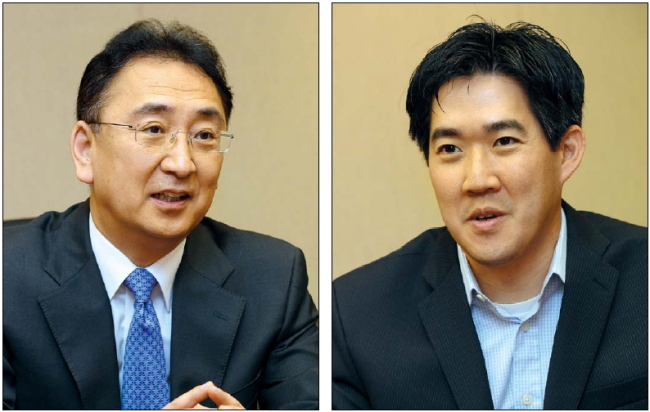First foreign legal service to open in Korea will focus on intellectual property, transnational affairs
Ropes & Gray, the first foreign law firm to operate in Korea, dismissed concerns that the influx of global giants would wither domestic legal services, as they would focus on their specialized realms of intellectual property, cross-border deals and offshore litigations.
The U.S.-based company began operating its Seoul office Friday after receiving a business license from the Ministry of Justice last week. It is the first overseas firm to register with the Korean Bar Association.
 |
William Yongkyun Kim (left), head of Ropes & Gray’s Korea office, and David Chun, Partner of the firm, speak during an interview with The Korea Herald. (Chung Hee-cho/The Korea Herald) |
“It is quite meaningful that we have become the No. 1 foreign law firm to start business in Korea,” said William Yongkyun Kim, head of Ropes & Gray’s Korea office, in an interview with The Korea Herald Friday.
“We have had Korean clients for more than 15 years. The opening of an office in Korea will help us provide detailed service,” he said.
Demand for transnational legal services among Korean corporates is expected to grow as more companies go global, seek overseas acquisitions and are involved in patent disputes.
With an extensive global network and expertise, multinational law firms are rushing into the nation to cater to the demand. In addition to Ropes & Gray, Sheppard, Mullin, Richter & Hampton from the U.S. and Clifford Chance from Britain were allowed to operate in Korea. Another nine foreign law firms have applied to start business in Korea.
Under Korea’s free trade agreements with the U.S. and EU, foreign legal consultants can set up in the country as of July 16.
They are allowed to run offices and advise Korean firms, but services are limited to international legal affairs during the first stage of market opening ― until July 2013 for European firms and until March 2014 for U.S. firms.
During the second stage they will be permitted to handle some forms of domestic litigation in alliance with local providers. Three years after that, they will be able to hire local attorneys, establish joint ventures and deal in domestic affairs.
The Korean legal market is estimated at a modest 2-3 trillion won ($1.5-2.2 billion). But Ropes & Gray Partner David Chun said that Korea has great market potential, since it is one of the countries with the most intellectual property rights-related litigation in the world.
Many Korean enterprises such as Samsung and LG are now involved in international litigation over patents and the number continues to soar year after year.
“I think it is a good sign in a way. It means that Korean products are making success in the world and that more people are recognizing it. Currently, large Korean enterprises are very sensitive about the intellectual property protection and we provide information and advice to their in-house legal teams,” he said.
Korea is the 11th destination for the firm, which is based in Boston and has almost 1,000 lawyers. It is a top-tier law firm in merger and acquisition and intellectual property rights management.
The firm’s clients include LG, Hyundai Motor, Hyundai Heavy Industries and NCsoft. Kim said that he had already received calls from potential clients seeking legal advice.
He dismissed fears by market watchers that foreign legal behemoths will outcompete with their relatively small domestic counterparts, which have less international experience, and lure big-name lawyers away from them.
“Rather than hiring one or two Korean lawyers for Korean law practice, seeking Korean firms’ cooperation would be reasonable,” he said.
The branch manager repeatedly stressed that the firm would not infiltrate into the realms of Korean fellows ― at least for a while.
According to the firm’s research, the amount of annual legal fees Korean corporations have paid to Korean law firms for domestic affairs have been stable over the past several years, standing at around $600 million.
But the money they have paid to foreign law firms for overseas problems amounted to $1 billion. This will be its main target, he said ― dealing with problems that have home jurisdiction in the U.S.
“Between 2006 and 2009, the growth rate marked around 40 percent. We could guess that the market showed similar growth rate since then. This is the market for us,” he said.
Kim said there are some areas that Ropes & Gray, as well as other foreign firms starting their advisory practices, will focus on.
“It is true that the U.S. and several other countries are leading the legal circle and we are developing cutting-edge legal technologies and contribute to value creation. We know how to deal with them,” he said.
Some industry insiders worry that foreign firms charge their Korean clients up to eight times that of Korean firms. Kim denied it as an exaggeration.
“But we should look at the quality of the service we are providing in the whole picture, not just an hourly charging system,” he said.
By Bae Ji-sook (
baejisook@heraldcorp.com)








